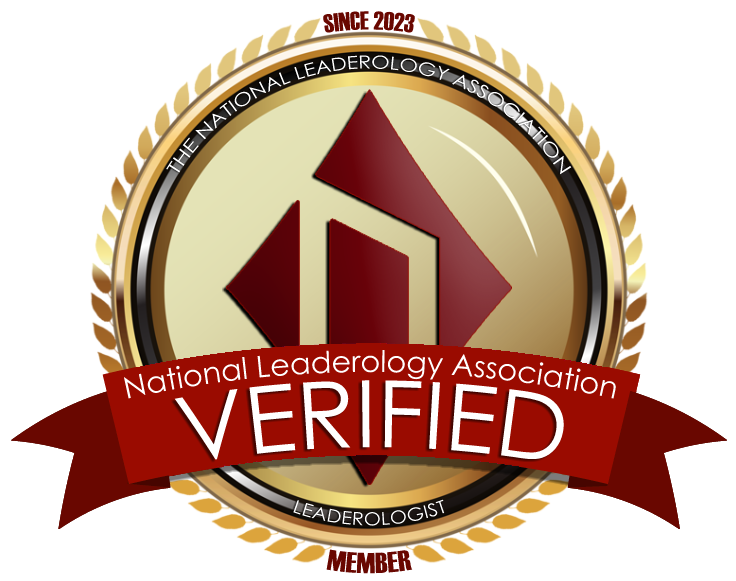
WHAT IS LEADEROLOGY?
Leaderology is the emerging disciplinary home for the scientific study of leadership. For decades, leadership was treated as an interdisciplinary interest that drew content from psychology, sociology, organizational behavior, communication, education, and management. Although these fields contributed essential insights, none treated leadership itself as the primary subject of inquiry. This began to change as more scholars pursued formal leadership degrees and focused their research specifically on leadership mechanisms, development, cognition, and outcomes. Leaderology reflects this evolution, providing a coherent disciplinary identity and a standard for academic and professional preparation.
Definition of a Leaderologist
A leaderologist is a professional who formally studies and analyzes leadership as a distinct discipline. The term reflects the rigor expected of individuals who examine leadership mechanisms, development, historical patterns, cross-cultural expression, and practical application. As with other social sciences, the field derives its structure from the classical suffixes of “-ology,” meaning the systematic study of a phenomenon, and “-ologist,” meaning a specialist within the field. Leaderologists analyze leadership in a manner consistent with other academic disciplines: through theory, empirical inquiry, structured methodologies, and application.
Purpose of Leaderology
The purpose of leaderology is to identify, test, and refine the principles and processes that make leadership effective. This includes the study of leadership development, the progression of leadership skill across a lifespan, and the influence of culture, context, and organizational structure on leadership behavior. It also includes the examination of historical leaders, modern leadership failures, and the psychological, cognitive, and behavioral mechanisms that shape leadership outcomes. Leaderology aims to create a coherent, evidence-driven body of knowledge that can be taught, evaluated, improved, and applied.
Why the Term Matters
The leadership field has long suffered from ambiguity and a lack of professional differentiation. Many individuals describe themselves as leadership experts despite having no formal education in leadership, which dilutes credibility and complicates public understanding. The designation leaderologist signals formal preparation in leadership theory, leadership research, and leadership practice. It differentiates trained professionals from self-proclaimed experts, improves public clarity, and helps organizations make informed decisions when seeking qualified practitioners. The term also communicates adherence to academic standards, contribution to leadership knowledge, and commitment to disciplinary integrity.
What Leaderologists Do
In Academic Settings
Leaderologists working in academic contexts engage in activities such as teaching leadership theory and application, conducting research, developing curricula, and mentoring students. They contribute to the scientific study of leadership through publications, conference participation, interdisciplinary collaboration, and the creation of leadership development frameworks. Academic leaderologists help shape the field by producing and disseminating research that advances the understanding of how leadership works and how leaders grow.
In Private Practice
Leaderologists in private practice apply leadership theory and evidence-based methods to assist individuals, teams, and organizations. Their work may include leadership coaching, executive consultation, organizational assessments, team development, strategic planning, conflict mitigation, and the design of leadership development programs. They may also provide workshops, training sessions, and tailored interventions for leadership effectiveness. Regardless of application, their work is anchored in a scientifically informed understanding of leadership mechanisms and development processes.
Educational Preparation
A leaderologist’s academic preparation follows the same expectations found in other social sciences. Practitioners typically hold multiple degrees in leadership, beginning with a bachelor’s degree and progressing through a master’s or doctoral degree in leadership or a leadership sub-specialization. Their coursework focuses on leadership theory, organizational behavior, leadership history, ethics, communication, decision-making, research methods, and related topics. Research training is a core component, preparing leaderologists to conduct independent studies, evaluate empirical evidence, and contribute to the leadership body of knowledge.
In addition to formal education, leaderologists pursue ongoing professional development through conferences, scholarly literature, mentorship, and participation in professional communities. Because leadership is an emerging discipline with evolving standards, continued growth is an essential expectation for all practitioners.
The Role of Leaderology in the Leadership Discipline
Leaderology establishes a clear academic identity for leadership studies. It distinguishes the field from management, provides a structured framework for evaluating competence, and supports the development of standards through organizations such as the National Leaderology Association. By naming the discipline, clarifying its expectations, and defining its practitioners, leaderology advances leadership toward the status of a mature, coherent, and scientifically grounded field.

